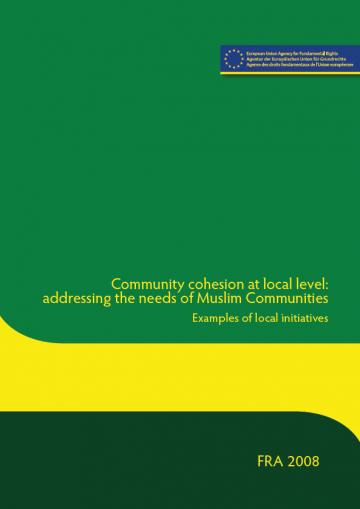
Community Cohesion at local level: Addressing the needs of Muslim Communities
This publication is aimed at policy makers and practitioners involved in addressing racism and discrimination or working in the field of equality, community cohesion and integration at the local level. In addition, it should be of value to those responsible for service delivery at the local level. The report cites examples of how mainstreaming non-discrimination can contribute to community cohesion and equality in a given community and shows that diversity and equality can reinforce each other within one community cohesion policy vision. Integration does not necessarily mean cohesion.
Key findings:
The report cites examples of how mainstreaming non-discrimination can contribute to community cohesion and equality in a given community and shows that diversity and equality can reinforce each other within one community cohesion policy vision. Integration does not necessarily mean cohesion.
The cities have developed a useful approach in order to bridge possible gaps between these two policy concepts: they have moved from a policy of integrating immigrants to a policy concept of addressing the needs of city residents.
These are valuable lessons to be learned and shared with municipalities and regions across Europe.
The cities have moved from a policy of integrating immigrants to a policy concept of addressing the needs of city residents. Each resident of a city is seen as having rights and responsibilities and an important role to play in improving inter-community relations and thus strengthening social cohesion. With the change in policy direction, strategy and vision, the cities showed a strong political commitment by developing a sense of citizenship, participation and mutual trust. This has been done in a response to recognition of "errors of the past":
(1) lack of mainstreaming of anti-racism and anti-discrimination measures in all public policies;
(2) lack of dialogue and leadership of the city on issues of community cohesion and non-discrimination and
(3) lack of responsibility of each community to take active part in building social cohesion.
The report demonstrates that mainstreaming certainly does not mean a one size fits all model of service provision; rather the awareness of different needs and consequently of different models of service provision becomes central to the operational priority of the local authority. In addition, mainstreaming equalities means primarily consulting people about how to meet their needs in order to be inclusive.
The local authorities should take the lead in developing an equality strategy that is aimed at combating racism and discrimination, with the active involvement of all ethnic communities concerned, including Muslim communities, civil society, and other relevant key partners.
What is the Local Communities Network (LCN)?
The LCN brings together the European Union Agency for Fundamental Rights (FRA), the Committee of the Regions and policy officers from the cities of Aarhus (DK), Antwerp (BE), Bradford (UK), Genk (BE), Mannheim (DE), Nantes (FR), Sheffield (UK), Rotterdam (NL) and Turin (I), in order to lead policy dialogue and exchange of good practice in addressing racism and discrimination, as well as issues specific to the situation of Muslim communities.
The LCN's objectives are to:
- to exchange information on innovative policies and implementation;
- to support the sharing and exchange of experience and good practice between local authorities and to encourage a learning process within the network;
- to support the further development of social cohesion policy by communicating the policy-relevant experiences and outputs of the network to European institutions and local and regional authorities.
Find out more about the Local Communities network (PDF).
Materials related to the launch of the report:
The Committee of the Regions, ECOS Commission and the FRA launched jointly on 3rd March 2008 the report "Community Cohesion at local level: addressing the needs of Muslim Communities". The meeting introduced the report, presented the work of the Local Communities network (LCN) and provided a discussion forum for topics highlighted in the Report. This publication aiming at policy makers and practitioners provides a number of examples of good practice or initiatives at the local level from across European cities.
- Meeting agenda (PDF): [ en ]
Presentations:
Education - optimum opportunities for all children, Anne Marie Larsen, Aarhus (PPT)
Local authorities and volunteers: teamwork and results - Some good practices from Genk, Vanessa Broux, Genk (PPT)
The role of DAAD in developing direct contacts with employers, Dick Vink, Rotterdam (PPT)
Positive action in employment, Rizwan Rehman, Bradford (PPT)
Taking part Being part - Muslim communities in Mannheim, Claus Preissler, Mannheim (PPT)
Active citizenship in public service Qudrat Shah Bradford (PPT)
